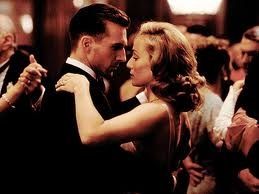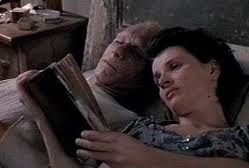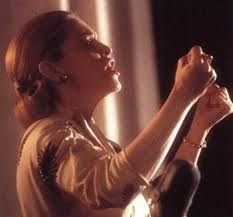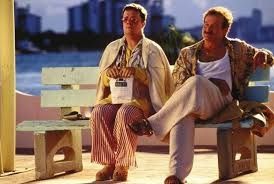Hana: "Betrayals in war are childlike compared with our betrayals during peace. New lovers are nervous and tender, but smash everything. For the heart is an organ of fire." For the heart is an organ of fire. I love that. I believe that. K? Who is K?
Almasy: K is for Katharine.
The English Patient definitely qualifies as one of the most depressing Best Picture winners.
When the movie begins, Count Laszlo de Almasy (Ralph Fiennes), horrifically burned beyond recognition and slowly dying, is being cared for by an Allied nurse, Hana (Juliette Binoche), during late WWII. Hana is emotionally traumatized by the death of her loved ones during the war ("I must be a curse. Anybody who loves me, anybody who gets close to me...or I must be cursed. Which is it?"), and is given permission to stay behind at an abandoned monastery in Italy to care for Almasy. As she cares for him, and gets to know him, the movie cuts between Almasy's flashbacks from before the war and his time in the monastery with Hana.

The movie is primarily a love story between Almasy, a Hungarian cartographer exploring the desert in Northern Africa, and Katharine Clifton (Kristin Scott Thomas), a British woman married to another man (Colin Firth). When Katharine and her husband join Almasy's geology group, there is an instant spark between Katharine and Almasy. Katharine has known her husband Geoffrey since they were very young, but they have just recently married: "We've been friends for donkey's years. Best friends .She was always crying on my shoulder about somebody. I finally persuaded her to settle for my shoulder. A stroke of genius." Though it is clear Geoffrey deeply loves Katharine, it appears that Katharine loves Geoffrey more like a best friend than a lover. She and Almasy begin a passionate love affair; however, Katharine becomes overwhelmed by guilt over betraying Geoffrey and eventually ends the affair, leaving them both broken-hearted (Almasy: "How can you ever smile, as if your life hadn't capsized?"). Little does she know that Geoffrey knew about the adultery, and that he has been suffering in silence until he finally cracks and crashes his plan, with Katharine in it, flying it into the desert at Almasy's feet: ""Surprise," he said. Poor Geoffrey. He knew. He must've known all the time. He was shouting, ''l love you, Katharine. I love you so much.''" Katharine is badly injured, but survives. Geoffrey does not. Almasy puts her inside a cave with some provisions while he makes the three day journey through the desert for help, promising to return:
 Katharine: Promise me you'll come back for me.
Katharine: Promise me you'll come back for me.Almasy: I promise, I'll come back for you. I promise, I'll never leave you.
Before he leaves, she reveals to him that she has never stopped loving him, when he observes that she is wearing the thimble he gave her as a gift on a chain around her neck:
Almasy: You're wearing the thimble.
Katharine: Of course, you idiot. I always wear it; I've always worn it; I've always loved you.
World War II has broken out, and when Almasy meets up with the British, they arrest him, mistaking him for a German. By the time he manages to escape and return to Katharine, she has died waiting for him. As he flies her body away from the cave, he is shot down, and suffers the burns and injuries we see him with at the start of the movie. See? Depressing.
In the monastery, Hana and Almasy are visited by a man named Caravaggio (Willem Dafoe). He is seeking revenge on Almasy. In desperation to get back to the cave and Katharine, Almasy had exchanged the maps his group had made of the area to the Germans, which had led to Caravaggio being captured and tortured by the Germans. In a really disturbing and unnecessary scene, we see his thumbs get cut off (well, some people see it -I covered my eyes). From him, Almasy learns that his best friend from his cartography group, Madox, a British man, had committed suicide after being told that Almasy was a spy and had turned over their maps to the Germans. Almasy is dismayed at his friend's death, and at the fact that Madox died incorrectly believing him to be spy. As if he needed more sadness and guilt in his bedridden, barely able to breathe, morphine addled life. At least Caravaggio gives up on the revenge idea once he hears the real story.

Hana, meanwhile, falls in love with a Sikh man named Kip, who is ridding the area of mines along with his friend and fellow soldier, Hardy. Sadly, sweet ol' Hardy gets blown up in a freak accident atop a statue, and Kip receives orders to relocate. He and Hana part on affectionate terms, but with no clear plans to meet again. At Almasy's request, and to round out the overall tone of death and misery throughout the movie, Hana gives Almasy a lethal dose of morphine, sobbing while she does so, and then reads him the letter Katharine wrote him while she was dying alone in the cave as he dies: "My darling. I'm waiting for you. How long is the day in the dark? Or a week? The fire is gone, and I'm horribly cold. I really should drag myself outside but then there'd be the sun. I'm afraid I waste the light on the paintings, not writing these words. We die. We die rich with lovers and tribes, tastes we have swallowed, bodies we've entered and swum up like rivers. Fears we've hidden in -like this wretched cave. I want all this marked on my body. Where the real countries are. Not boundaries drawn on maps with the names of powerful men. I know you'll come carry me out to the Palace of Winds. That's what I've wanted: to walk in such a place with you. With friends, on an earth without maps. The lamp has gone out and I'm writing in the darkness."
You leave this movie with a heavy heart, and the desire to get in bed and pull the covers over your head.
In spite of strong performances from the actors involved, it really is not a great movie. Hint: Making a movie as sad as humanly possible (and killing off as many characters as possible) does not make it good, though it apparently does make for an Oscar winner, however undeserving.
 |
| The English Patient vs. Out of Africa. |
There are some similarities between this movie and Out of Africa, though Out of Africa was a much stronger movie. This one also has a scene with the couple flying together in a two-seater plane -well, she's dead in the plane in The English Patient, but hey, she still looks good. There's a hair washing scene with Katharine washing Almasy's hair (as Denys washed Karen's hair in Out of Africa). Almasy makes a comment about not wanting to be owned ("Ownership. I hate being owned."), which parallels Denys, except that Almasy clearly doesn't mean it, as he is a bit stalkerish of Katharine and he freaks out when she ends their relationship -perhaps Karen Blixen should have followed her example and played a little hard to get? Both movies are set against the backdrop of a war (Out of Africa coincides with WWI), and Almasy is an adventurer like Denys. But The English Patient, though romantic, lacks any of Out of Africa's sense of joy in living. The tone is melancholy from start to finish. It is also without Out of Africa's incredibly beautiful scenery. I am not overly enamored of the desert, and even the scenes in Italy feel washed out.
I won't be watching The English Patient Again.
 |
| Frances McDormand in Fargo. |
There were two movies that I thought were Oscar-quality this year, and the critics didn't agree with me (neither of the movies were even nominated), but oh well.
One is Evita. It did not get the credit I feel it deserved. Madonna was incredible as Eva Peron, former First Lady of Argentina -alternately innocent, wounded, powerful, conniving, and haunting. She really was perfect for the part. I think that people were against her because of her reputation, but she gave a wonderful performance. She looked the part, her voice was beautiful, her dancing great, her acting spot on. Of course, I have always loved the music of Evita, and this was a terrific rendition of the musical. Antonio Banderas and Jonathan Pryce were also well cast.

"I am only a simple woman who lives to serve Peron in his noble crusade to rescue his people! I was once as you are now, and I promise you this: we will take these riches from the Oligarchs -only for you -for all of you! One day you too will inherit these treasures! Descamisados! Mis compañeros! When they fire those cannons, when the crowds sing of glory, it is not just for Peron, but for all of us! For all of us!"
-Evita
"The chorus girl hasn't learned the lines you'd like to hear. She won't go scrambling over the backs of the poor to be accepted -by making donations just large enough to the correct charity. She won't be president of your wonderful societies of philanthropy. Even if you asked her to be -as you should have asked her to be. The actress hasn't learned the lines you'd like to hear. She won't join your clubs, she won't dance in your halls. She won't help the hungry once a month at your tombolas. She'll simply take control as you disappear."
-Evita
"Oh what I'd give for a hundred years! But the physical interferes every day more -Oh my Creator! What is the good of the strongest heart in a body that's falling apart? A serious flaw -I hope you know that."-Evita
 The other is The Birdcage, a hilarious movie about a gay couple, Armand Goldman, who owns a gay nightclub called The Birdcage, and Albert, who performs at the club as Starina. I adored Robin Williams and Nathan Lane in this movie (and Hank Azaria was hilarious as their housekeeper, Agador). Nathan Lane is charming as Albert. The character is so feminine I find myself thinking of Albert as a she (him dressing in drag while performing naturally adds to this effect). Albert is very dramatic, which sometimes leads to him bickering with the more serious Armand when Albert feels unappreciated. Things become chaotic when Armand's son becomes engaged to the daughter of the very conservative Senator Kelley (Gene Hackman), and the Kelley family (the daughter is played by Calista Flockhart and the mother by Dianne Wiest) goes to visit their future in-laws. Armand's son requests that they "play it straight," which leads to hilarity. Aside from the humor, it is also a touching love story between Armand and Albert. Terrific acting. There should have been performance Oscar nominations here.
The other is The Birdcage, a hilarious movie about a gay couple, Armand Goldman, who owns a gay nightclub called The Birdcage, and Albert, who performs at the club as Starina. I adored Robin Williams and Nathan Lane in this movie (and Hank Azaria was hilarious as their housekeeper, Agador). Nathan Lane is charming as Albert. The character is so feminine I find myself thinking of Albert as a she (him dressing in drag while performing naturally adds to this effect). Albert is very dramatic, which sometimes leads to him bickering with the more serious Armand when Albert feels unappreciated. Things become chaotic when Armand's son becomes engaged to the daughter of the very conservative Senator Kelley (Gene Hackman), and the Kelley family (the daughter is played by Calista Flockhart and the mother by Dianne Wiest) goes to visit their future in-laws. Armand's son requests that they "play it straight," which leads to hilarity. Aside from the humor, it is also a touching love story between Armand and Albert. Terrific acting. There should have been performance Oscar nominations here.Armand [Helping Albert act more masculine]: Al, you old son of a bitch! How ya doin'? How do you feel about that call today? I mean the Dolphins! Fourth-and-three play on their 30 yard line with only 34 seconds to go!
Albert: How do you think I feel? Betrayed, bewildered...Wrong response?
Armand: I'm not sure.
-The Birdcage
Albert: You know, I used to feel that way too until I found out that Alexander the Great was a fag. Talk about gays in the military!
-The Birdcage
Albert: Don't give me that tone!
Armand: What tone?
Albert: That sarcastic contemptuous tone that means you know everything because you're a man, and I know nothing because I'm a woman.
Armand: You're not a woman.
Albert: Oh, you bastard!
-The Birdcage
The Academy (and the critics) just got it wrong in 1996.
I do think that some years the academy should just announce that there are no nominees for the best picture that year. My vote would have gone too me for being a heck of a sport.
ReplyDelete